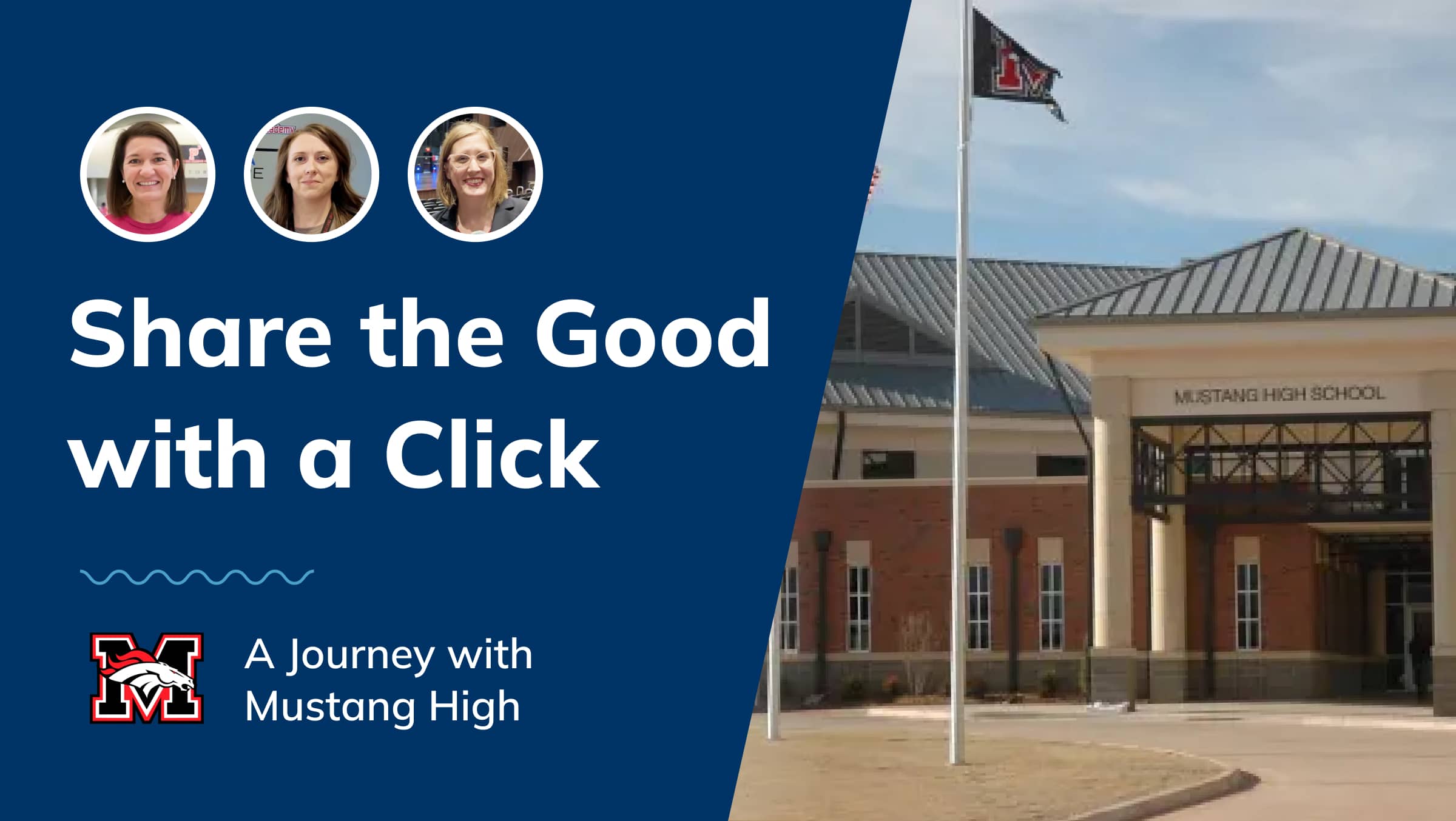Last month, we hosted our 3rd MingaCon user conference in Oklahoma at Mustang High.
MingaCon events are all about helping schools get the most out of Minga. Think of it as two days packed with connection and inspiration: day one is a personalized tour of the hosting school with hands-on training (where you really see the magic in action), and day two is filled with workshops, round tables, and speakers sharing ideas that actually work. Attendance includes schools from across the state, all looking for ways to maximize their use of Minga.
Mustang High was the perfect host. They’re what we’d call a “power user” of Minga. Their journey started with challenges that sound familiar to almost any school—hallways packed, tardies off the charts, and staff stretched thin. But what we found on this visit was bigger than fixing operations. It was about unlocking something every school wants: a culture where positivity spreads like wildfire.
Fixing the Foundations
With nearly 4,000 students, Mustang needed a system that worked. They went all-in on Minga, and when they saw results, they even installed 17 branded kiosk stations across campus for tardy check-ins. The impact? Immediate.
Tardies dropped by 80%. Teachers got their mornings back.

“With 4000 students, they were not doing what they needed to do. And so when we implemented Minga, we saw a change immediately.”
Dr. Kathy Knowles, Head Principal, Mustang High, OK

Image Description: Cody Little, Assistant Principal of Mustang High, shows neighboring schools the newly installed tardy stations. With 17 stations across the school, they make tardy check-ins easier and hold students more accountable. Teachers love it because they no longer have to take tardies.

“One of the hardest jobs prior to Minga was all the tardy attendance stuff, especially for the first part of the day… So I have not taken a tardy at all this school year and it’s been absolutely freeing.”
Emily Farnham, Teacher, Mustang High, OK
This was the reset Mustang needed. And once the day-to-day chaos was under control, they could finally think bigger.
From Hesitation to Leap of Faith
Here’s where the story takes a turn. Like many schools, Mustang knew they wanted to focus on culture but weren’t sure where to start. A small group of staff came together to sketch out a points system and a student store. But just like any school, hesitation set in—and the questions piled up. What do we actually do with points? What should rewards look like? How do we get teachers on board?
Instead of overthinking, Mustang went for it.

“We just decided to start and put a couple of different points in there, a couple of different prizes. We didn’t explain it. We didn’t really tell the teachers or even students—we just put it out there.”
Angelica Hull, Admin Assistant
And here’s the twist—they didn’t crash and burn. They saw momentum almost immediately. Staff started handing out praises. Students started asking questions. The vibe started to shift.
Student Praise, Points, and the School Store
By August, Mustang had a simple formula: give more praise, turn those praises into points, and then let students redeem points in a store. At first, the leadership team wasn’t sure if high schoolers would take it seriously.

“I thought that’s never going to work with high school kids. They are not going to care. They’re going to laugh at us.”
Dr. Kathy Knowles, Head Principal
But then? The students leaned in.

“Kids were saying, that’s cool, I got a praise. The more they got, the more we heard about it.”
Angelica Hull, Admin Assistant
Snacks and drinks were an easy win, but what really surprised everyone was the popularity of fidget toys, stress balls, and yes—even stickers.

“Even our principal said, these are high schoolers—they’re not going to go for stickers.”
Angelica Hull, Admin Assistant
Turns out, they did. And they loved it.
The first store opening had just nine students redeeming points. The second? Eighty-three students cashed in more than 500 points. That’s a serious jump in engagement.
Parents, Community, and Culture
Recognition didn’t just stay inside the walls of Mustang High. When the school invited parents and the community to donate prizes or gift cards, the impact spread even further. And it wasn’t just about the donations—students were feeling the power of praise at home too.
That’s one of the real strengths of Minga: it doesn’t just keep parents in the loop, it opens up the story of their child’s day. Families can be notified not only when something goes wrong, but when their student is doing something great.
One student shared:
“When I first got a praise, my dad was so excited for me. He printed out the email he got of the praise. I’m not even kidding—he printed it out just because I raised my hand in class.”
Student, Mustang High, OK
That’s the power of simple recognition—it starts conversations at home and makes positivity visible beyond the school.
Creative, Low-Cost Rewards
Of course, not every reward required a budget. Mustang leaned on experiences and recognition that carried just as much value as physical prizes. At first, there was hesitation—who’s really going to want lunch with the principal? But like any good business, you have to ask your customers. And when they asked the students, the response was clear: “Wait, I could have lunch with the principal? That’s awesome.”
Some of the most popular redemptions didn’t cost a thing. They were just unique, cool perks that not everyone gets. Here are the top five:
- Golf cart ride to class
- Lunch with the principal
- Prom or football tickets
- Yearbook (donated or extra copies)
- Public shout-outs (intercom, app, TVs)
One student’s excitement said it all:

“This six-four junior boy was so excited to hear his name announced—it was joyful. He saved up points just for recognition.”
Angelica Hull, Admin Assistant
Sometimes it’s not about the prize itself—it’s about being seen.
Students Leading Students
Another surprise? The store is fully student-run. Special education students and entrepreneur classes manage inventory, order products, and handle the POS system.
With cell phones restricted on campus, the store quickly became a hub where students engaged with each other in new ways. They’d browse rewards, plan how to earn points, and share excitement about what they could redeem.
It wasn’t just about buying snacks—it was about building ownership and connection.
Takeaway for Educators
Mustang’s story is proof that you don’t need a perfect plan to start changing culture. A little courage, a simple system, and a willingness to try can make all the difference.
By combining praise, points, and a student-led store, Mustang built an environment where positivity is contagious, recognition is celebrated, and students feel valued.
Recognition drives engagement. And sometimes, all it takes is a shout-out, a sticker, or even a golf cart ride to remind students: you matter here.





